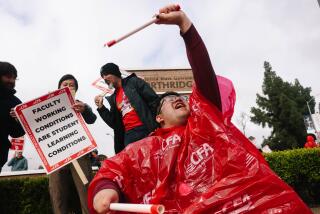Returning the Focus to Teaching
- Share via
In a farsighted move that sets a refreshing example for higher education, Stanford University President Gerhard Casper has announced that his administration will create 20 new permanent teaching positions exclusively for lower-division courses. The development underlines the sometimes forgotten fact that educating students remains the primary task of a university.
Many colleges tout classes that place top-flight academic talent face to face with the best students. But for the first two years of undergraduate study, students far more often must cope with crowded lecture halls and distant instructors, an atmosphere about as intimate as a sports arena.
Students prefer and deserve smaller classes. So do the parents paying sky-high tuitions. Typically, however, classroom teaching ranks far below prestigious research and publishing when it comes to economic rewards. Many schools seek to lure the most desirable employees to their faculties by offering them light teaching loads.
Five years ago, Donald Kennedy, the previous Stanford president, began to put greater emphasis on instruction by providing cash rewards to outstanding teachers. He also acted, in the face of resistance, to encourage top faculty members to teach underclassmen. Now, under Casper, the university will invite its 57 academic departments to compete for the added faculty slots, all of which will be committed to teaching undergraduate seminars.
Some in the academic community complain that Stanford’s deep pockets allow it luxuries other schools can’t afford. They have a point. But Casper’s innovative move comes at a time when federal research grants have begun to dry up, when the university budget is down $17 million from three years earlier and when millions are still to be paid for repairs from the 1989 Loma Prieta earthquake.
No one is suggesting that universities make their best researchers teach introductory chemistry or physics. But what’s often been lacking, by admission of some of the nation’s top university officials, is the commitment to reward teaching. The strong message emanating from Palo Alto may well help reverse that.
More to Read
Sign up for Essential California
The most important California stories and recommendations in your inbox every morning.
You may occasionally receive promotional content from the Los Angeles Times.










